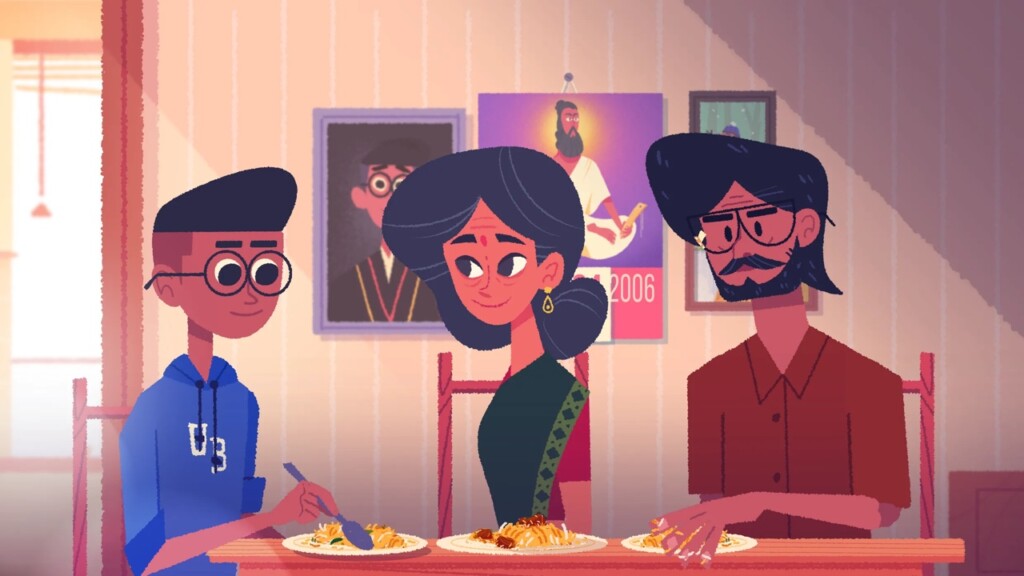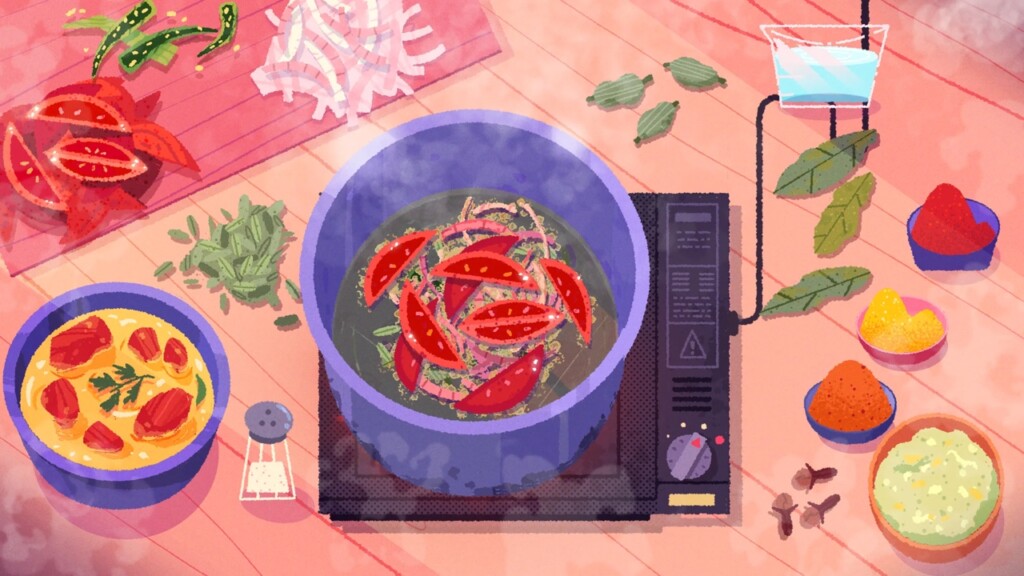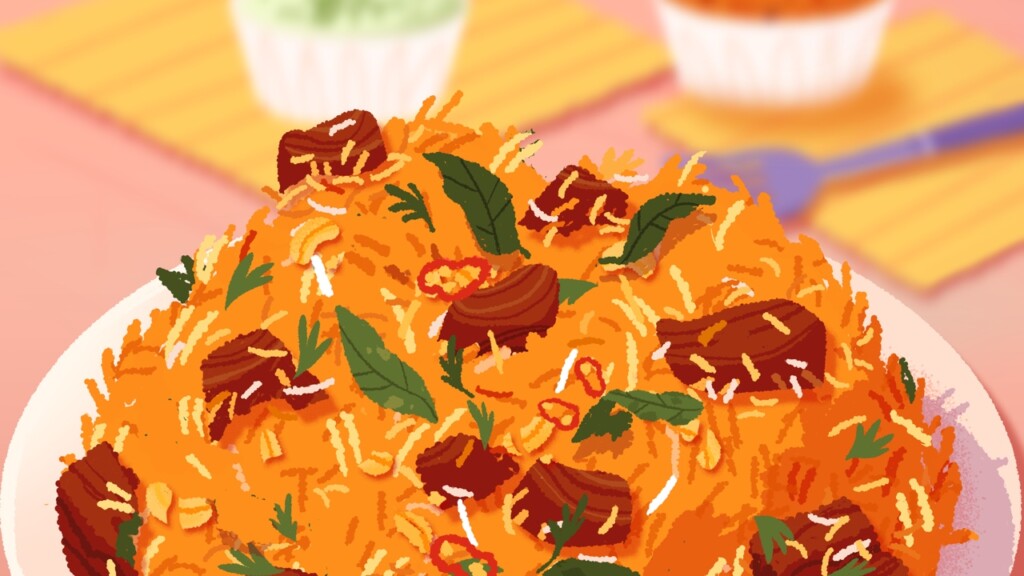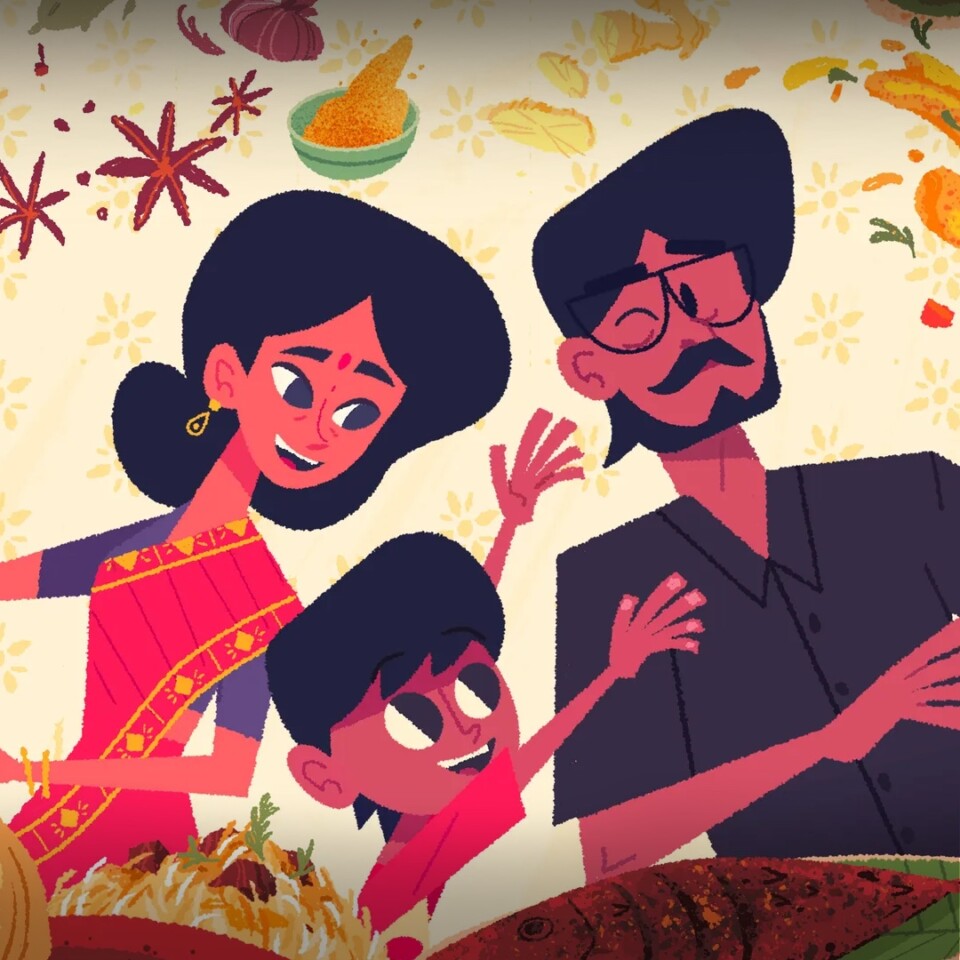When publishers passed on Venba, the game’s commercial prospects looked slim, but the public’s appetite for a very personal cooking game proved the tastemakers wrong.
Venba is a cooking game in which you play as an Indian immigrant mother in 1980s Canada. It’s a narrative adventure that explores the themes of love and family against the backdrop of cooking South Indian dishes and restoring lost recipes.
Following its success at the Game Developers Choice and IGF awards, Abhi – designer, programmer and writer at Visai Games – delivered an insightful GDC talk about Venba‘s journey from conception to release.
~ Ingredients ~
The well-deserved awards for Venba suggest that the game had a winning blend of ingredients from the start. However, as Abhi explains, the project evolved considerably over time, and many publishers were initially sceptical of its prospects.
“From the beginning, it was about a very specific feeling,” Abhi says. “In early 2020, when I was at my parents’ place, my mom was fussing a lot over food, and that’s pretty normal for her. It had me thinking about why food plays such an important role in South Asian cultures, specifically for South Asian mothers. Generally, in media made by diasporas, I feel it often focuses on the second generation, the assimilated children. It doesn’t flesh out the less assimilated immigrant parents.”
Abhi says that parent characters often have over-emphasised accents and behavioural tropes. He was keen to show the other side of this, saying that parents who moved countries in their 30s or 40s probably have the most interesting stories to tell.
“The idea of a mother who has sacrificed a lot for her family, and she’s communicating to her son through the language of food was very profound for me. It was very exciting to be able to tell this through the lens of South Indian food, which is something I’m very, very fascinated about.”

Abhi began developing the idea for the game with artist and friend Sam Elkana. They were both working for mobile game companies and wanted to find funding to start a new studio and develop Venba full-time. As they juggled these responsibilities, Abhi began to tease ideas and elements of the game on social media.
“I started posting little GIFs and glimpses of it on Twitter, and I found that there was a lot of reaction and engagement. So it really felt like the game was as special as I thought it was. It was getting a lot of momentum, and it gave us some confidence. So I started reading articles like ‘How do indie games get started’ and the consensus was basically, you build a vertical slice. You show it to publishers, and you hope to get it funded. So that’s exactly what we planned to do.”
With a small playable slice in place and a modest budget proposal, Venba was pitched to every publisher who would take the call. After six months and no success, a message about the game’s perceived commercial viability was becoming clear
“They weren’t quite sure if there was a market for a visual novel with cooking elements,” Abhi explains. “And we weren’t similar enough to other cooking games on the market where I could just point to something and say, this is going to be that, but slightly different. In retrospect, it was understandable why Venba, even with the tiny budget we were asking for, was considered risky.”
Abhi says that even though he thought the game was shaping up to be something special, the criticism stung, and doubts about its quality began to creep in.
~ Method ~
Towards the end of 2020, Wholesome Games reached out to see if Venba could be included in a winter direct showcase.
“We had three weeks to make a trailer for them, but we definitely didn’t have enough gameplay to make a whole trailer,” he reveals. “I felt like this was our last chance to put the game out there. Most of what you see in the trailer doesn’t make it to the game, and if it did make it to the game, it’s dramatically different. It still feels like a trailer for Venba, and I think it does a good job of capturing what the player promises for the game. On the day of the premiere, we definitely did not expect the kind of reaction we got.”
The trailer was an immediate hit, going viral and propelling Venba onto multiple most-anticipated game lists. Preview coverage across major game websites followed, and within a week, Abhi received emails from Nintendo, Sony, and Microsoft enquiring about bringing the game to their platforms. As a result of the buzz, the fledgling studio also secured funding, including backing from various Canadian art funds.
“We were now at a point where we didn’t need publishers,” Abhi says. “So within a span of a few months, Venba went from being unfundable, to not needing a publisher, and being profitable even before it was released.”
It’s notable, explains Abhi, that Venba’s shift in fortunes didn’t happen because of any significant changes within the game itself. What changed, he says, was the perception. The trailer and subsequent audience reaction proved there was a market for the game, and this reduced the perceived level of risk from publishers and platform holders.
“It made me realise that it’s better to see publishers as VCs rather than creatives. They will fund something that they’ve seen working in the past, and I think I would have had an easier time if I pitched something like ‘South Asian Hades’ or something like that,” he jokes. “If it’s something new or different, I think it’s a bit more of a risk for them.”
Abhi adds that when dealing with publisher feedback, it’s prudent to not internalise it too much.
“Publishers thinking that the market isn’t ready for your game is not the same as whether the market is actually ready for your game,” he says.
As development ramped up, Abhi and the team worked to refine Venba’s core gameplay tenets. The concept of players restoring a recipe book was in place from the start, but it underwent significant changes as the team tried to balance authenticity with playability. Initially, says Abhi, it was too easy for the instructions to look like an overwhelming list of ingredients.
“I was very particular about wanting to capture the essence of these recipes, so simplifying it didn’t feel like an option to me,” he explains. “Technically, it was a puzzle, but if you opened the recipe book and saw this, you’re going to feel overwhelmed as a player, and it didn’t really make for fun or interesting gameplay.”
“I wasn’t sure what to do here because I didn’t want to compromise on the authenticity of the recipes. And this kind of commitment to authenticity caused problems, even outside the recipe design.”

Remarkably, inspiration for solving these challenges came from the TV series, Community. In the episode Advanced Documentary Filmmaking, the dean has to make a commercial to promote Greendale Community College. Throughout the episode, the dean gradually descends into madness as the commercial becomes increasingly elaborate and goes over budget. For Abhi, the parallels with game development were clear to see.
“The further I got into Venba‘s development, the more I related to the dean, which is not a good sign. We both wanted the same thing right? The thing we were making had to be perfect. For me, perfectionism didn’t just feel like a creative endeavour. It also felt like a moral responsibility because we were dealing with authenticity and representation.”
The episode ends with the character of Abed using fly-on-the-wall footage of the dean’s endeavours to make a 30-second advertisement. The final result is no work of art, but it does the job.
“When it’s shown to the board of directors, they say my favourite line from the show,” says Abhi. “They say, ‘It’s good. You know what? It’s better than good. It’s good enough!’ This is such a good and funny line to me because it shows how creatively bankrupt they are. They couldn’t care less about the trailer being any good. They just wanted to be good enough. But it’s also very inspiring because it’s this perfect ode against perfectionism. And it became my motto that I repeated throughout development.”
“With that in mind, I let go of the idea that everything has to be 100% accurate. And I started to simplify things while still retaining authenticity.”
Using the game’s biryani level as an example, Abhi shows how the mechanics changed to only focus on the part of cooking and mixing ingredients that are most enjoyable for the player. Tasks like grinding spices and marinating food would all be done beforehand. This retained the required authenticity but didn’t overwhelm the player.
“These kinds of compromises are present throughout the game, but it took a long time to figure out how to do it properly. Recreating everything accurately led to boring, confusing, and expensive gameplay,” Abhi says.
“Whenever you recreate something in a game, you have to go through a process where it’s abstracted, simplified, and stylised. Because of these simplifications, Venba isn’t a game that you can play and walk away from learning how to cook all these dishes, but it is a game that will make you want to learn how to cook them. And to me, I thought that was better than good.”
~ Serve ~
The cooking aspects of Venba are integral to the game’s objective of telling a simple yet affecting story of an immigrant mother and her relationships with her family and culture through the shared experience of food.
“I was worried that players might see the story of this very specific family and misunderstand it as the general experience for the entire culture,” says Abhi. “But, that’s not really my problem to solve. If I made Venba about everything then it’s not really about anything. Venba is a representation, but it’s not representative of the culture it shows. And that’s okay. I wanted to make this game because I wanted to tell a very particular story.”

Shahrin Khan, the game’s producer, believed the concept of Venba would resonate with players, saying that it would make people want to call their mothers. Venba launched in July 2023 with positive reviews and strong sales. The critical and commercial success was undoubtedly welcome, but Abhi feels that the most satisfying aspect has been the emotional impact it has had on players.
“We had an outpouring of very kind and heartfelt messages since launch and it’s continued to today. It really seemed to resonate with a wide variety of people. I had people on launch week send pictures of close-ups of their eyes to show that they’ve been crying. And yes, a lot of people did call their moms,” Abhi admits.
“I had people tell me that they booked flight tickets impulsively to go see their moms after playing Venba. It’s also become this genre of ‘here’s a game that I want to show my mom and play together with my mom.’ Those kinds of experiences are not something I could have predicted.”






